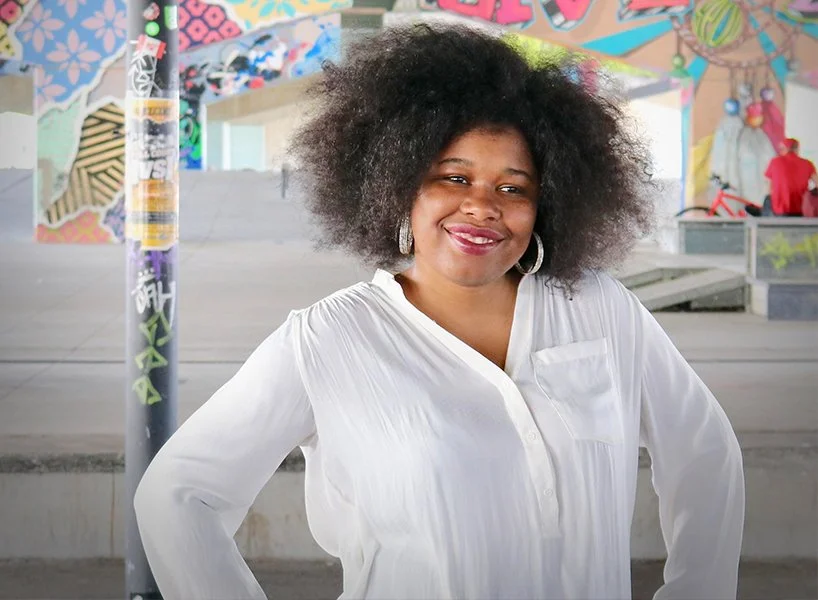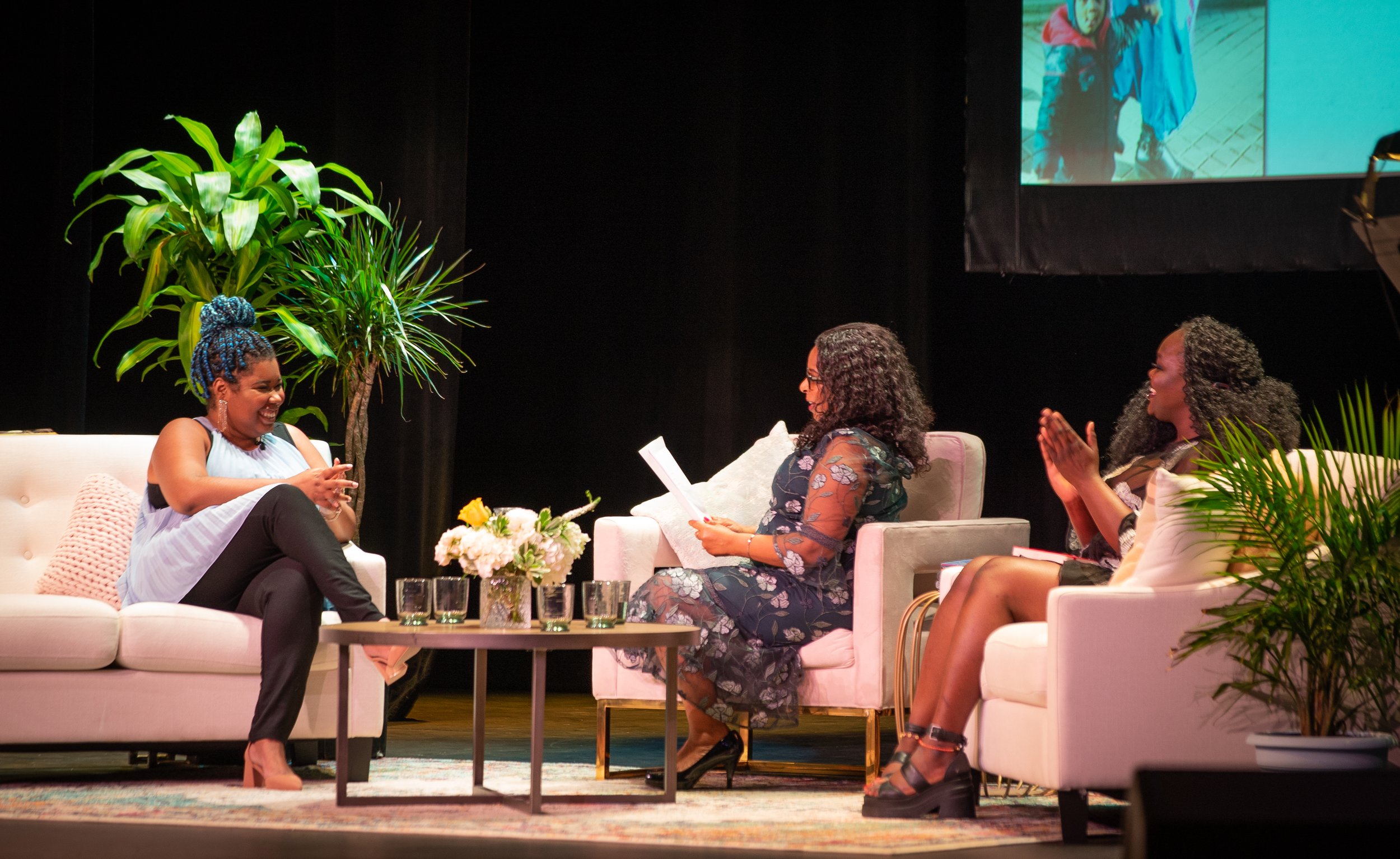Zalika Reid-Benta on Frying Plantain
Zalika Reid-Benta is only in her early 30s, but her first book Frying Plantain has already marked her as a superb illustrator of Jamaican-Canadian experience. Her elegant collection of linked stories calls to mind Margaret Laurence’s coming of age classic A Bird in the House. Set in the Little Jamaica neighbourhood of Toronto, Frying Plantain tells the story of Kara Davis, a young woman of Jamaican-Canadian heritage who must adapt to the white peers who see her as bold, and to the Jamaican-Canadian friends who see her as soft. At the same time, Kara also feels caught between two maternal figures: her scholarly mother and her judgmental grandmother – two women who are frequently at odds.
Kara is a departure from perky, outspoken heroines of classic girls’ literature like Anne Shirley of Green Gables or Josephine March. She is written more in the mold of Selina in Bajan Paule Marshall’s Brown Girls, Brownstones. This is to say that Kara is internal and introspective. Reid-Benta is making a point: “What about the quiet girls?” she said when I interviewed her onstage this summer for Luminato’s celebration of Toni Morrison. “When I was younger a lot of the heroines were very precocious. But, what about the people who can’t do that,” continued Reid-Benta, perhaps thinking of herself.
Kara’s family dynamics question the traditional representation of maternal figures as “angels in the house.” Reid-Benta’s work shares the complicated, intergenerational concerns of contemporary writers of Caribbean descent, including Jamaica’s Nicole Dennis-Benn (Patsy) and Bajan Cherie Jones (How the One-Armed Sister Sweeps Her House). I asked Reid-Benta about the unrelenting nature of Kara’s grandmother, Verna, her often hostile treatment of her daughter, Eloise (Kara’s mother). Whenever I came across these intense passages in the book they left me, a Jamaican woman, viscerally distressed. But Reid-Benta explained in her typical low-key, matter-of-fact way: “Familial love can look like many different things,” she said. “ For Black women growing up and navigating and living in a patriarchal, racist society can be hardening. And when you become hardened, your love becomes hard.”
Did I mention that Zalika Reid-Benta, is wise beyond her years?
*******
Below is my interview with Zalika Reid-Benta in which we discuss her nostalgia for Toronto’s Little Jamaica neighbourhood, young literary heroines and the challenges of loving white Black.
Donna Bailey Nurse: Hi Zalika. So good to be with you.
Zalika Reid-Benta: So good to be here.
DBN: I haven’t seen you since you were the most gorgeous and glowing woman at the Scotiabank Giller Prize gala last year. You all should have seen what she was wearing! Awesome!
ZRB: Thank you.
DBN: You are one of our hometown girls tonight. Can you tell us about growing up in the Little Jamaica area of Toronto? Can you tell us about the atmosphere and the sense of community and what it was like for you?
ZRB: Sure. I actually moved around Toronto a lot. I started out around Yonge and Charles and then we moved to Little Jamaica. My grandmother was already living there so I had been there quite often. And I couldn’t really put it into words, but every time I visited my grandmother’s house there was this sense of community. I would see hair products that my mother would use in the stores, and I was like “Oh! I don’t see that where I’m living.” We would go to Randy’s (RIP) to get patties. Back then the music would be coming out of the stores and it just felt like home. Then I lived there for a bit when I was a young girl and it felt natural to be able to just get up and go to the hair salon – (I mean you’d spend all day but you know it would just be there). Also, because Caribana had started there too, I was jumping up in Kiddie Carnival. I remember when they were grilling corn on the (steel) drums on the road. And then that left. And then I left, just before gentrification was starting. I remember having a sense of unease when I left. I moved around the GTA (Greater Toronto Area) a bit more. Then I moved to New York. When I came back everything was gone.
DBN: What does it mean for your writing and for your life that you grew up with a sense of community, that quite frankly, many Black Canadians don’t have?
Donna Bailey Nurse interviews Zalika Reid-Benta at Luminato 2022
ZRB: It was interesting because in terms of Frying Plantain, I wrote most of it when I was in the States. That was an interesting experience because half of the people (who read it) were like: “Is this even Canadian?” And I was like, “Yes.” And sometimes the dialogue is in patois and explaining that was also a little frustrating.
But every time I came back home something was different. And it wasn’t necessarily just in Little Jamaica. I remember getting an email saying that The Biggest Bookstore is gone; Sam’s is gone; Honest Ed’s is gone and just feeling devastated. Those were places of my childhood. At that time, I wasn’t writing where Frying Plantain took place because I was so nervous of being thought of trying to represent an entire community. It wasn’t like I felt it was a burden. But we’re not a monolith and I didn’t want to be seen as trying to do something that I possibly cannot do. Paul Beatty (The Sellout) was one of my mentors and he told me, “ Specificity is key: You really need to do that.”
Because every time I came back to Toronto things were different, I said to myself I need to write this down, because I don’t want to forget it and I don’t want other people to forget it, if anybody ever reads my book. I just want it memorialized in some way. So, then I put in all the street names. I put in all the different things I could remember, like the 7-11 that was there. I was going back and trying to look through pictures. I really want this time and this place and the Yorkdale I grew up with to be crystalized.
DBN: Thank you so much. Tell us a bit more about your heroine, Kara.
ZRB: Kara was actually the hardest character for me to write because of the way people responded to her. I wrote the novel in the States, and I wrote it during workshop. I wrote it for my thesis - my MFA. And people kept saying Kara doesn’t do anything. She’s just a camera. But I was thinking there are things going on internally. Maybe I need to flesh that out a bit more. But I’m also one of those people who doesn’t like to say precisely everything that’s happening. I like readers to come up with their own interpretations and to figure things out. I don’t think everything has to be spelt out. When I was younger a lot of the heroines were very precocious, very outgoing- and that’s great. But what about the quiet girls? What about the people who can’t do that? It’s really difficult talking about how Frying Plantain came to be because I feel like it’s been in me since I was a kid. I just wanted a protagonist who had a lot going on internally and who can stand up for herself when she is pushed a little too far. But generally, she doesn’t do outgoing things. I just wanted a quiet character as my protagonist.
DBN: There’s a challenging dynamic between Kara, her mom, and her grandmother. Why did you think that was something interesting to write about? What were you trying to say by writing about it?
ZRB: This is what I mean when I say that it is difficult for me to explain Frying Plantain: It’s not like I sat down and decided it would be interesting to write this. I just had to. These characters were in me, and they just came out. What I will say is that I grew up watching a lot of TV and a lot of movies. I went to a lot of plays. I just kept seeing white families and the ways that they interacted with each other. And, love can look different. Familial love can look like many different things. The thing with Verna and Eloise- Kara’s grandmother and mother- is there is so much love there. But there is so much baggage at the same time. And Black women growing up and navigating and living in a patriarchal, racist society can be hardening. And when you become hardened, your love becomes hard. They’re screaming at each other because they can’t stand each other. Yet, when Eloise has nowhere to go, she can go to her mother. Also, they are very strong personalities. They are more similar than they would like to admit. Kara is the quiet person, and she has to watch these two strong-willed, outgoing, fierce women. I think what was interesting was making the grandfather quiet. I really wanted her to have a connection with the grandfather, even if she doesn’t necessarily like what he does because he is a source of dysfunction in the family. We can’t always help who we bond with. Sometimes you have that natural thing.
DBN: I appreciate what you are saying. Even though I have this feeling to push back a little bit. I’ ve been reading a lot of Caribbean literature lately and there is this grandmother figure I’ve seen in the last three or four books. One is your book. One is Nicole Dennis-Benn’s novel Patsy as well as her previous novel, Here Comes the Sun. And then, Cherie Jones’s How the One- Armed Sister Sweeps Her House. (Cherie is from Barbados and Nicole is Jamaican). In each case the grandma is super-hard. I appreciate when you say that life and racism can harden people. But what exactly is this hard thing? And in Kara’s case, what is this soft thing?
Donna Bailey Nurse interviews Zalika Reid-Benta at Luminato 2022
ZRB: I think this “hard thing” is being tough so no one can mess with you. I think you have to learn not to be too sensitive because the world is not going to pay attention to your feelings. I think it’s trying to teach you to navigate the world. It might not necessarily be the right way to do it. But that’s what’s happening. I saw this tweet in which the person tweeted that her niece did not pronounce a word properly and everybody started teasing her. Someone responded, if you taught your culture better, she wouldn’t have mispronounced the word. But then there was this thread that said there is a tradition of teaching through teasing that happens in Jamaican culture. And that’s very, very accurate. With the grandmother in my book there is a sense of control for appearance’s sake. I think that’s because white people already look at us in a certain way, so we have to keep up appearances. That’s what her generation believes. Then you have Eloise’s (her daughter’s) generation saying, well, that’s a pretty colonial mindset; I don’t know if I’m going to deal with that. And then there’s Kara who’s just figuring it out. She’s in between these two people. But Kara is a sensitive child. She is a very soft child. She doesn’t want to be because that’s pitied. Her cousins say, “Come on! You gotta toughen up!” Then you have her grandmother saying, “But she’s soft. She’s Canadian.” And that’s aggravating to Kara. This is my roundabout way of saying this hardness is how you survive this world. And I’m going to teach you how to do it by being hard on you.
DBN: Wow. Thank you. I really appreciate that. You are very committed to the fact that these three women love each other. And that this is the shape of their love. For Toni Morrison mother love is the quintessential love and she often uses mother love as a measure of the human capacity for love. When did you start to read Toni Morrison and how has she influenced your work?
ZRB: I started reading Toni Morrison very early. It was also Beloved (like Francesca). My mother was reading it for school. My mother was also very much about books and learning. I took it from her bookshelf-because I used to do that; I used to just take the books off her bookshelf not knowing what they were- and I tried to read Beloved when I was about 8. It did not make any sense to me whatsoever. But I had a feeing while I read it. It just stuck with me. Every couple of years I would ty to read the book again. So I say I grew up reading Beloved because every couple of years it made more sense to me. For instance, there’s a passage where you see Sethe’s scars on her back and Paul D. describes it as a tree. When I was younger, I thought there was a branch literally in her back. And I was like, WHAT?! And it stuck with me. I was telling my friends about it: “There’s this book and there’s this branch…” The older I got I realized it was a description of the scars. How vivid is her writing that I actually thought there was a branch in her back? That’s amazing. So Beloved is also my favourite book of hers because of my whole history with it.
DBN: Thank you Zalika! That was fabulous.







